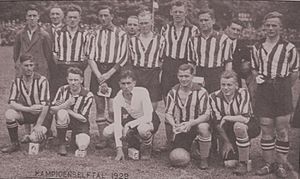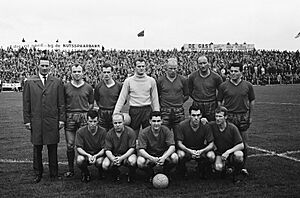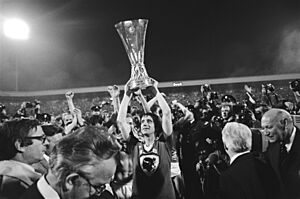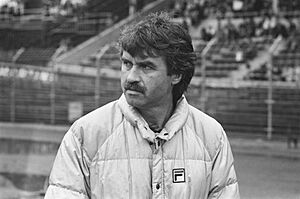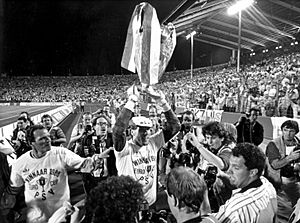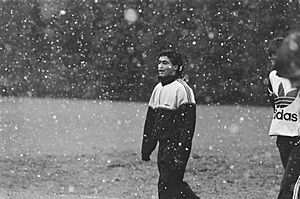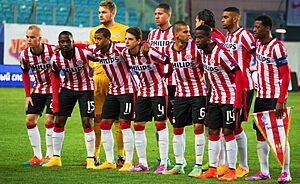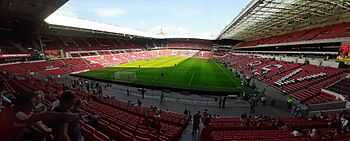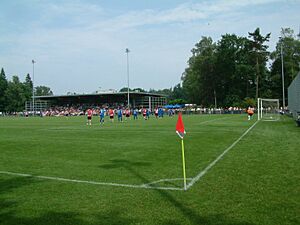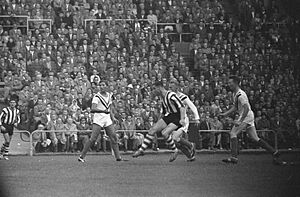PSV Eindhoven facts for kids
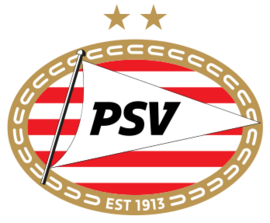 |
||||
| Full name | Philips Sport Vereniging NV | |||
|---|---|---|---|---|
| Nickname(s) | Boeren (Peasants/Farmers) Lampen (Lightbulbs) Rood-witten (Red and whites) |
|||
| Founded | 31 August 1913 | |||
| Ground | Philips Stadion | |||
| Capacity | 35,000 | |||
| Chairman | Robert van der Wallen | |||
| Head coach | Peter Bosz | |||
| League | Eredivisie | |||
| 2022–23 | Eredivisie, 2nd of 18 | |||
|
||||
Philips Sport Vereniging, or PSV, is a famous Dutch sports club from Eindhoven, Netherlands. It is best known for its professional football team. This team has played in the Eredivisie, the top football league in the Netherlands, since it started in 1956. PSV is one of the "big three" clubs in the country, along with Ajax and Feyenoord. These three teams have won most of the Eredivisie titles.
The club was started in 1913 for employees of the Philips company. PSV has had two amazing periods of success. One was when they won the UEFA Cup in 1978. The other was in 1988, when they won the 1987–88 European Cup as part of a "seasonal treble" (winning three major trophies in one season). The team has won the Eredivisie 26 times, the KNVB Cup 11 times, and the Johan Cruyff Shield a record 14 times. As of May 2025, PSV is ranked 27th in UEFA club rankings.
Over the years, PSV has become known as a place where talented players start their careers. Many players who became famous at big European clubs or on the world stage played for PSV first. Some of these stars include Ruud Gullit, Ronald Koeman, Romário, Ronaldo, Arjen Robben, and Cody Gakpo.
Since it was founded, PSV has played in the Philips Stadion and has always worn its red and white club colours. The club has strong ties with Philips, which can be seen in their sponsorships and shared technology. Fans call themselves 'boeren', which means 'peasants' or 'farmers' in Dutch. They are proud of Eindhoven being a city in the Brabant region, away from the big capital cities.
Contents
Club History
Early Years and First Wins (1913–1962)
The Philips company created a football team for its employees in 1910 called the Philips Elftal. This team played at the Philips Sportpark, where the current stadium is located. Due to financial problems, this team stopped, and in 1913, PSV (Philips Sport Vereniging) was founded on August 31. This date was chosen because Philips was celebrating 100 years since the French were defeated in the Napoleonic Wars.
The football part of the club officially became PSV in 1916. Because of World War I, PSV could only join a league in the 1915–16 season. Their very first match was a 3–2 loss against Willem II Reserves on September 19, 1915. PSV quickly moved up through the leagues, reaching the top division, the Eerste Klasse, by 1921. They were briefly relegated in 1925 but returned to the top league a year later. Since 1926, PSV has always played in the highest possible Dutch league.
In 1929, PSV won its first league championship. They won six out of eight matches in the championship play-offs. A big 5–1 win against Velocitas from Groningen secured the title. PSV won the district league several more times and then secured their second national championship in 1935.
During World War II, fewer people came to matches. After the war, PSV signed new players like Piet Fransen and Coen Dillen. In 1950, PSV won its first KNVB Cup by beating HFC Haarlem 4–3 in extra time. A year later, in 1951, PSV won another league title. Coen Dillen, known as "The Canon," scored 21 goals that season. Goalkeeper Lieuwe Steiger also played a huge role, playing 383 matches for PSV.
In 1955, PSV became the first Dutch club to play in the European Champion Clubs' Cup. In the 1956–57 season, Dillen scored an amazing 43 goals, which is still a Dutch record today. By the 1960s, PSV started signing players from all over the Netherlands, not just the Brabant region.
The Van der Kuijlen Era and UEFA Cup Win (1963–1978)
In the 1962–63 season, PSV celebrated its 50th anniversary by winning its fourth league title. Willy van der Kuijlen joined the team in 1964 and quickly became a top scorer.
In 1972, Kees Rijvers became coach, and things really started to change for PSV. With Van der Kuijlen and goalkeeper Jan van Beveren as key players, Rijvers built a strong new team. They signed players like Ralf Edström and the famous twins Willy and René van der Kerkhof. Van der Kuijlen, a very skilled player, worked well with Edström, who was great at heading the ball. This led to a Dutch cup victory in 1974. PSV also won the league for the fifth time in 1975, with Van der Kuijlen scoring 28 goals.
A year later, PSV won its first "double" (winning both the league and the national cup). They secured the league title after beating Feyenoord 4–1 and won the national cup by beating Roda JC 1–0. In the European Cup, they almost reached the final but lost to Saint-Étienne.
In 1978, PSV had a fantastic league season, winning the title without a single loss. They also had a very successful UEFA Cup campaign. After beating teams like Barcelona, they reached the final against Bastia. The first match was a draw, but PSV won the return leg in Eindhoven 3–0. Goals from Willy van de Kerkhof, Gerrie Deijkers, and Van der Kuijlen gave PSV its first European trophy!
Hiddink and the European Cup Victory (1979–1989)
After the UEFA Cup win, the team struggled for a while. Coach Rijvers left, and key players like Van Beveren also departed. PSV invested in new players, but it took some time to find success again.
In 1985, the club decided to make big changes. They signed exciting players like Ruud Gullit, Søren Lerby, Gerald Vanenburg, and Eric Gerets. Gullit quickly became captain and helped the team win the 1985–86 Eredivisie title. In 1987, Guus Hiddink became the new coach, and Ronald Koeman joined the team. That season, PSV won the league title again.
The 1987–88 season was PSV's best year ever! They won the Eredivisie with four games to spare, scoring an incredible 117 goals. They also won the Dutch cup by beating Roda JC 3–2 in extra time. The most exciting part was their European Cup journey. They beat strong teams like Galatasaray and Real Madrid. The final against Benfica in Stuttgart ended in a 0–0 draw. In the penalty shoot-out, goalkeeper Hans van Breukelen saved Benfica's sixth penalty, winning the European Cup for PSV! This completed their historic "treble" – winning the league, cup, and European Cup in one season.
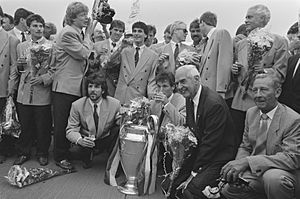
After this amazing season, PSV continued to win. In the 1988–89 season, they won another double (league and cup). However, they lost the Intercontinental Cup and UEFA Super Cup.
Developing New Talent (1989–1999)
After their European success, PSV signed the incredible Brazilian player Romário. He scored 19 league goals in his first season. In 1989, after Koeman left, PSV finished second in the league but won the KNVB Cup. Guus Hiddink left in 1990, and Bobby Robson took over. Under Robson, PSV won two more league titles. Romário was a top scorer but sometimes caused problems with his unprofessional behavior. He left for Barcelona in 1993.
In 1994, Dick Advocaat became coach. PSV signed Luc Nilis and a young 17-year-old Brazilian named Ronaldo. Ronaldo scored 30 goals in his first season! After an injury-filled second season, Ronaldo left for Barcelona. That season, PSV won the KNVB Cup.
In the 1996–97 season, Advocaat built a strong team with players like Phillip Cocu, Jaap Stam, and Boudewijn Zenden. They won the Eredivisie title, with Nilis being the top goalscorer. Many key players and Advocaat left in 1998, so PSV had to rebuild. Bobby Robson returned for a year. New signing Ruud van Nistelrooy scored 31 goals in his first season, forming a great partnership with Nilis.
Dutch Dominance (2000–2008)
In the 1999–2000 season, PSV comfortably won the league title. Van Nistelrooy was scoring many goals but got injured. The 2000–01 Eredivisie was also won with new striker Mateja Kežman.
In 2002, Guus Hiddink returned as coach and director. He brought in new talents like Arjen Robben, Park Ji-sung, and Lee Young-pyo. Their first season back brought another league title. In 2004, even though Kežman and Robben left, Hiddink had built a very powerful team with players like Heurelho Gomes, Alex, Park, Lee, Mark van Bommel, and the returning Phillip Cocu. They won the Eredivisie five matches before the end and also won the KNVB Cup.
In the Champions League, PSV reached the semi-finals for the first time in a long time. They beat Monaco and Lyon, but narrowly lost to AC Milan in a thrilling semi-final.
After 2005, many key players left. PSV still reached the Champions League knockout stage but lost to Lyon. They won the league again but lost the cup final to Ajax. Hiddink left, and Ronald Koeman became coach. In the 2006–07 season, PSV almost lost a huge lead in the league but managed to win the title on the very last day due to goal difference. In the 2007–08 season, PSV won their fourth league title in a row, again on the last day.
Recent Years (2008–Present)
After 2008, PSV went through some changes in coaches and players. They faced financial challenges but worked hard to secure their future. In 2010, PSV made headlines by beating Feyenoord 10–0 at home, which was a historic win and Feyenoord's biggest defeat ever.
In 2013, Phillip Cocu was appointed as head coach. On April 18, 2015, PSV won the Eredivisie after a 4–1 win over Heerenveen. This was their first league title since 2008 and ended Ajax's four-year winning streak. In December 2015, PSV reached the Champions League knockout stages, a big achievement for a Dutch club. They defended their league title in 2016 in a very exciting final game of the season. PSV won the Eredivisie again in 2018 by beating Ajax 3–0.
On March 30, 2022, it was announced that former PSV star Ruud van Nistelrooy would become the manager for the 2022–2023 season. He won the Johan Cruyff Shield and the KNVB Cup in his first season. In January 2024, PSV had a perfect winning record in the first half of the Eredivisie season (17 wins, 0 losses, 0 draws). They continued this strong form and won the Eredivisie title in the 2023–24 season. They also won the 2024–25 title.
Club Crest and Colours
PSV's first crest had a light bulb and the words "Philips Sport" in a circle. The current crest is an oval shape with red and white horizontal lines and the letters "PSV" on a flag. Only small changes have been made over time, like adding two stars to celebrate winning twenty league titles. For their 100th birthday in 2013, a special laurel wreath and the number "100" were added temporarily.
The club colours, red and white, were chosen in 1913. The first uniform had red and white vertical stripes, black shorts, and red and white striped socks. This was worn until the 1970s, when they switched to an all-red shirt. In 1989, they went back to striped shirts, which they have kept ever since.
PSV had the same jersey sponsor, Philips, from 1982 until 2016, which is a record in Dutch football. In 2016, energiedirect.nl became the main shirt sponsor. Philips still sponsors the club, but not as the main shirt sponsor. Since 2019, a group of companies from the Brainport Eindhoven area jointly sponsor PSV, with their name displayed on the shirt.
Stadium and Training Facilities
PSV has played at the Philips Stadion since it was founded in 1913. It was first called Philips Sportpark. The stadium is in the Philipsdorp area, a neighborhood built by Anton Philips for employees. The first wooden stand was built in 1916. During World War II, the stadium was damaged but was repaired after the war.
In 1958, four tall floodlights were installed, allowing evening matches. The stadium has been expanded and improved many times. In the 1990s, the stands were made taller, and the corners of the stadium were closed off, adding more seats. This made the capacity 35,000. In 2005, the tall fences around the pitch were removed and replaced with lower railings. People who run onto the field now face a large fine and a ten-year ban.
The Philips Stadion is highly rated by UEFA. It has special areas for young fans, disabled fans, and away fans. There's also a "Family Corner" for children up to 12 and their parents. The stadium also has stores, offices, and restaurants. A PSV Museum was opened in the stadium for the club's 100th anniversary. PSV's training sessions and youth teams use the De Herdgang facility, which has ten fields and fitness areas.
Fans and Rivalries
PSV usually has about 33,000 fans at their Eredivisie matches. The record attendance was 35,200 in a match against Feyenoord in 2002. The club always saves tickets for visiting fans.
PSV has two main fan groups: the Supportersvereniging PSV and PSV Fans United. There are also fan groups like Lighttown Madness that create amazing displays (tifo choreography) in the stadium. The PSV Junior Club, now called Phoxy Club after PSV's mascot Phoxy, was started in 1998 for children up to 12. More than 20,000 children are members! Every year, there's a Phoxy Club Day where members can meet the first team players. PSV also has an Open Day before the season starts for all fans. The official club song was introduced in 1950 and is sung at every home match at 19 minutes and 13 seconds into the game, honoring the club's founding year (1913).
PSV's biggest rivalry is with Ajax. These two teams often compete for the league title. PSV fans call themselves boeren (peasants/farmers) and chant this at home games. This shows their pride in their Brabant heritage, which is different from the big city of Amsterdam where Ajax is from. The flag of North Brabant is often seen in and around the stadium.
PSV used to have a rivalry with FC Eindhoven, another team from the city. FC Eindhoven was seen as the "people's club," while PSV was only for Philips employees. In the 1940s and 1950s, both teams competed for the league title, which made the rivalry stronger. Matches between them were called the Lichtstadderby (City of Light Derby). However, FC Eindhoven's success declined, and the rivalry faded. Today, the fans are generally friendly, and the clubs even share a women's team and youth setup.
Club Organisation
PSV used to be a simple association until 1999, when it became a public limited company with shareholders. This means they have a board of directors who advise and supervise the club. Most of the club's shares are owned by a foundation called the Foundation PSV Football. The general manager is in charge of all club activities, supported by other managers. PSV also has a director of football who handles player transfers and long-term plans.
Philips founded PSV, and for many years, only Philips employees could join the club. Players who signed a football contract were also offered a job at Philips. Philips was the kit sponsor from 1982 until 2016. Frits Philips, who was in charge of the Philips company from 1961 to 1971, was a big supporter of PSV. He even had his own spot in the stands until he passed away and sometimes gave pep talks to the team during half-time. Philips also used PSV to show off new technology. For example, a match between PSV and FC Eindhoven in 1950 was the first televised football match in the Netherlands, with Philips providing the equipment.
In 2011, PSV had a budget of €60 million. To stay financially healthy, the club had to qualify for the UEFA Champions League every year. When they didn't, they faced financial challenges. To help, they sold the land under the stadium and training facilities to the Eindhoven city for €48.4 million. They also got loans from Philips and local businesses.
In 2016, energiedirect.nl replaced Philips as PSV's main shirt sponsor. Philips still sponsors the club, but with a smaller amount. In 2019, several major companies from the Eindhoven region, including Philips, ASML, Jumbo, VDL, and High Tech Campus, teamed up to jointly sponsor PSV. Their name, ‘Metropoolregio Brainport Eindhoven’, is now on the shirt.
Statistics and Records
PSV has won 26 league championships, which is the second-highest in Dutch football, after Ajax (36). They have won the KNVB Cup 11 times, placing them third behind Ajax and Feyenoord. PSV holds the record for the most Johan Cruyff Shield wins, with fourteen.
PSV has achieved the "double" (winning the league and cup) four times. Their 1988 double was part of a "treble" (winning three major trophies), a rare feat achieved by only six other European clubs. Between 1985 and 1989, and again from 2005 to 2008, PSV won the Eredivisie four times in a row. PSV has played in a European competition every year since 1974, which is one of the longest streaks in Europe.
Willy van der Kuijlen holds the record for the most league appearances (528 matches) and most league goals (308 goals) for PSV, playing from 1964 to 1981. Willy van de Kerkhof is second with 418 league matches. The second-highest goalscorer is Coen Dillen with 288 goals. Dillen's 43 goals in the 1956–57 season is still a national record for goals in one season. PSV also holds a national record for the longest time without letting in a goal: 1,159 minutes in 2004.
The largest transfer fee PSV has ever received was €30 million for Ruud van Nistelrooy when he moved to Manchester United in 2001. The most expensive player PSV bought was Mateja Kežman for €11.3 million in 2000.
In 2010, PSV famously beat Feyenoord 10–0, which was a huge win and Feyenoord's biggest loss ever. As of January 2019, PSV had 1.85 million followers across all social media platforms.
Honours
| Type | Competition | Titles | Seasons |
|---|---|---|---|
| Domestic | Eredivisie | 26 | 1928–29, 1934–35, 1950–51, 1962–63, 1974–75, 1975–76, 1977–78,1985–86, 1986–87, 1987–88 |
| KNVB Cup | 11 | 1949–50, 1973–74,1975–76, 1987–88, 1988–89, 1989–90, 1995–96, 2004–05, 2011–12, 2021–22, 2022–23 | |
| Johan Cruyff Shield | 14 | 1992, 1996, 1997, 1998, 2000, 2001, 2003, 2008, 2012, 2015, 2016, 2021, 2022, 2023 | |
| Continental | European Cup/ UEFA Champions League | 1 | 1987–88 |
| UEFA Cup/ UEFA Europa League | 1 | 1977–78 |
- record
European Results
Players
First-team squad
|
|
Jong PSV
Retired Numbers
12 – Club Supporters (the 12th Man) 99 – Phoxy (Mascot)
Personnel
Technical Staff
| Position | Staff |
|---|---|
| Head coach | |
| Assistant coach | |
| Goalkeeping coach | |
| Fitness coaches | |
| Physiotherapists | |
| Team manager |
Last updated: 30 March 2024
Source: [1]
Management Team
| Position | Staff |
|---|---|
| Supervisory Board | |
| CEO | |
| Director of Football | |
| Director of Finance | |
| Director of Commercial Affairs |
Last updated: 15 August 2022
Source: [2]
Notable Fans
- Klaas Dijkhoff, a politician
- Sander van Doorn, a DJ
- Fresku, a rapper
- Cees Geel, an actor
- Michael van Gerwen, a famous darts player
- Pieter van den Hoogenband, a former Olympic champion swimmer
- John van den Heuvel, a crime journalist
- Kempi, a rapper
- Frank Lammers, an actor
- Theo Maassen, a comedian
- Guus Meeuwis, a singer
- Frits Philips, a former CEO of Philips and a big supporter of PSV
- Jos Verstappen, a former Formula 1 driver
- Max Verstappen, a current Formula 1 driver
- Lucille Werner, a television presenter
See also
 In Spanish: PSV Eindhoven para niños
In Spanish: PSV Eindhoven para niños
- Works team
 | Lonnie Johnson |
 | Granville Woods |
 | Lewis Howard Latimer |
 | James West |


